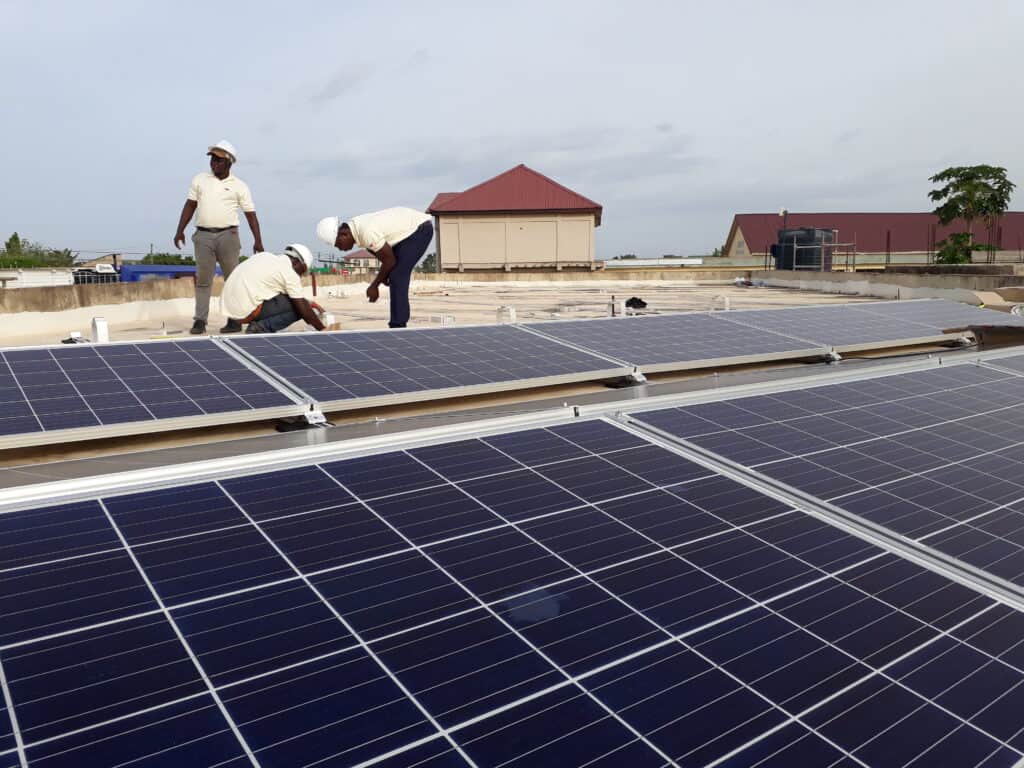Solar isn’t just good for industry and commerce – it’s necessary
For many, the idea of solar systems in emerging countries conjures up images of solar panels on clay houses. While the work of solar utilities that power off-grid homes and villages is important, we often overlooked the economic potential of solar for businesses. Solar systems on industrial facilities and offices have the power to improve the electricity supply. They also increase the standard of living and strengthen the economy.
Reliable power supply is a rarity in many emerging countries
A stable and affordable power supply is not only critical to the local population, but also for industry. However, this is not the reality in many developing countries, where both controlled and unplanned power outages are commonplace.
Why? Energy utilities cannot cover the energy demand with their existing power plants. Plus, an insufficiently developed network exacerbate the problem. The consequences are dramatic. Indeed, at regular intervals, regions must be disconnected from the mains for hours at a time. This is to ensure that the congested networks do not completely collapse. This so-called load shedding is an emergency measure that has become the norm in many African countries.

Power cuts cause serious problems for companies
For companies, the situation is difficult. During a power outage, establishments either grind to a halt or switch to their own diesel generators. But that produces electricity at a high cost. Naturally, the resulting pause in production or increased operating costs can cause serious economic damage. Employees may lose their jobs and in the worst case, the company can even go bankrupt. Ghana is an example of a country where this has become a serious issue, as illustrated in this video from the BBC.
Network and power plant expansion will take decades. Meanwhile, the demand for energy grows exponentially, intensifying the situation. A smarter approach is through solar systems, which can diminish the issues faced both in the short and long term.
Solar systems are the inexpensive alternative

Solar systems are installed locally to produce electricity that is consumed locally. During peak times, such as the middle of the day when energy is required for air conditioning, solar panels create enough power to alleviate the strain on the grid. Larger solar systems of businesses (20kW to 200kW) and industry (200 kW to 5 MW) are especially efficient in making up for the lack of capacity on the grid.
Additionally, solar systems in emerging countries reduce high energy costs. In a study by the Association of Ghana Industries (AGI), 53% of entrepreneurs in Ghana said that high energy costs are the biggest obstacle for their business, after experiencing an electricity cost increase of almost 60% in Q4 of 2015. Solar systems reduce the reliance on the national grid and provide businesses with low-cost solar energy. It can save them around 30% on their total energy costs. Furthermore, it reduces greatly CO2 emissions and environmental pollution.
A stable and affordable power supply is not only critical to the local population, but also for industry. However, this is not the reality in many developing countries, where both controlled and unplanned power outages are commonplace.
Strong businesses = strong economy in emerging countries
The positive impact of solar systems on the industry can have an immense impact on the overall economic strength of these countries. As the middle class generates more than 80% of all jobs in Africa, the success of industrial and commercial businesses has a direct impact on the population. Giving businesses access to solar systems not only helps them to keep energy costs low but can significantly contribute to securing existing jobs and creating new jobs for local workers. With the current lack of unemployment opportunities for highly educated young people in countries like Kenya, a secure and growing job market is needed now more than ever before.
Related Posts
Sustainable ways to generate income
Green Wealth, Financial Health It seems for the past year or so, everybody’s talking about passive income. For a while it was…


